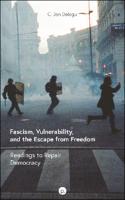Fascism, Vulnerability, and the Escape from Freedom
Readings to Repair Democracy
| dc.contributor.author | Delogu, C. Jon | |
| dc.date.accessioned | 2022-11-10T12:08:18Z | |
| dc.date.available | 2022-11-10T12:08:18Z | |
| dc.date.issued | 2022 | |
| dc.identifier | OCN: 1350936513 | |
| dc.identifier.uri | https://library.oapen.org/handle/20.500.12657/59202 | |
| dc.description.abstract | A worldwide struggle between democracy and authoritarianism set against a backdrop of global surveillance capitalism is unmistakable. Examples range from Myanmar, China, and the Philippines to Hungary, Turkey, Russia, and the United States. Fascism, Vulnerability, and the Escape from Freedom offers a multidisciplinary analysis drawing on psychology and literature to provide readers with a deeper understanding of the mechanisms that drive people to abandon democracy in favor of vertically organized authoritarianism and even fascism. In a comparative study of texts selected for their insights and occasional blind spots regarding fascist experiments of the past 100 years, Delogu examines fascism’s exploitation of fear (of change, loss, and death), disruption, and extreme inequality. The book offers an accessible and persuasive argument linking fascist authoritarianism, also called “right-wing populism,” to certain underlying conditions, such as a rise in us-versus-them thinking; distrust or simple apathy regarding democratic institutions, norms, and results; the vulnerabilities that result from extreme inequality (economic, social, racial); and addictions and codependency. Stressful events, such as a pandemic, an environmental disaster, or deep recession aggravate these harmful factors and make the fascist temptation, including the use of violence, almost irresistible. Delogu’s distinctive examination of texts that plumb the unconscious reveal linkages between actions and unavowable motives that purely historical and theoretical studies of fascism leave out. Erich Fromm’s neglected 1941 classic Escape from Freedom serves as a key reference in Delogu’s study, as does Robert Paxton’s authoritative history, The Anatomy of Fascism (2004). After underscoring the argument and urgent context around these two studies (Hitler’s Germany and George W. Bush’s post-9/11 America), Delogu examines novels, a diary, memoirs, and manifestos to show how vulnerability forces individuals to choose between exclusionary fascist authoritarianism and inclusive, collaborative democracy. | en_US |
| dc.language | English | en_US |
| dc.subject.classification | thema EDItEUR::J Society and Social Sciences::JP Politics and government::JPA Political science and theory | en_US |
| dc.subject.classification | thema EDItEUR::J Society and Social Sciences::JP Politics and government::JPF Political ideologies and movements::JPFQ Far-right political ideologies and movements | en_US |
| dc.subject.classification | thema EDItEUR::J Society and Social Sciences::JP Politics and government::JPH Political structure and processes::JPHV Political structures: democracy | en_US |
| dc.subject.other | authoritarianism;democracy;Erich Fromm;fascism;political theory;right-wing populism;Robert Paxton;surveillance capitalism | en_US |
| dc.title | Fascism, Vulnerability, and the Escape from Freedom | en_US |
| dc.title.alternative | Readings to Repair Democracy | en_US |
| dc.type | book | |
| oapen.identifier.doi | 10.53288/0392.1.00 | en_US |
| oapen.relation.isPublishedBy | 979dc044-00ee-4ea2-affc-b08c5bd42d13 | en_US |
| oapen.relation.isFundedBy | b1908adf-d68d-456c-a2cf-de2efabd7373 | en_US |
| oapen.relation.isbn | 9781685710804 | en_US |
| oapen.collection | ScholarLed | en_US |
| oapen.pages | 479 | en_US |
| oapen.place.publication | Brooklyn, NY | en_US |
| oapen.remark.public | Funder name: Institut d’Études Transtextuelles et Transculturelles (IETT) |

